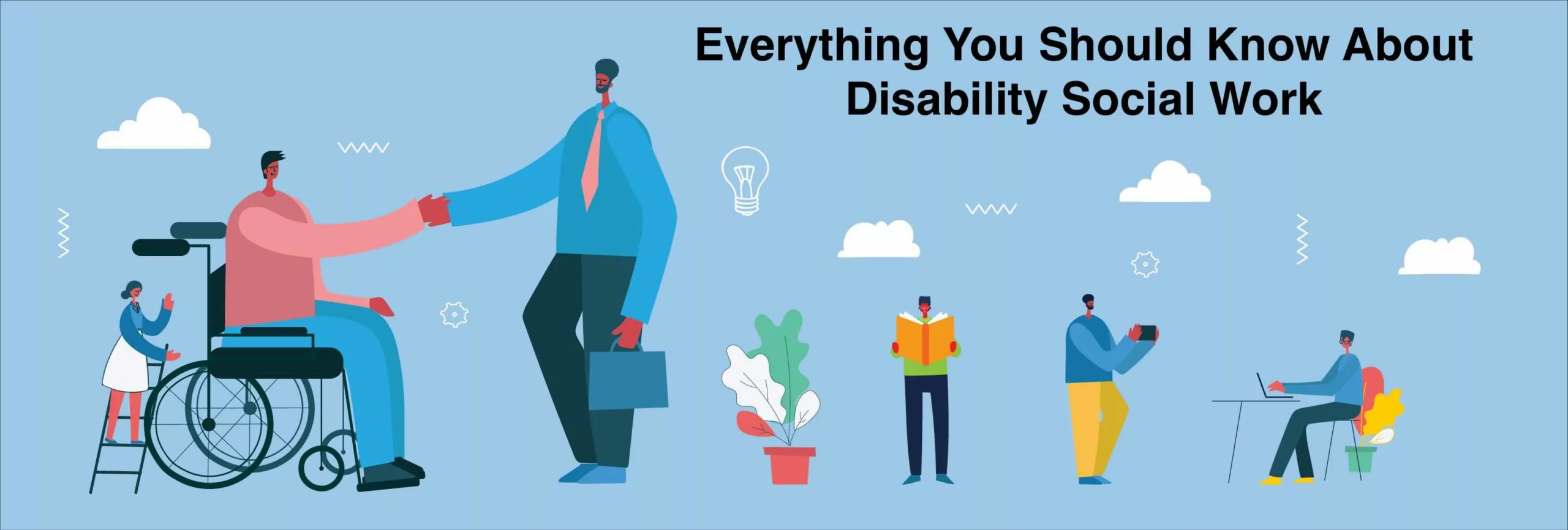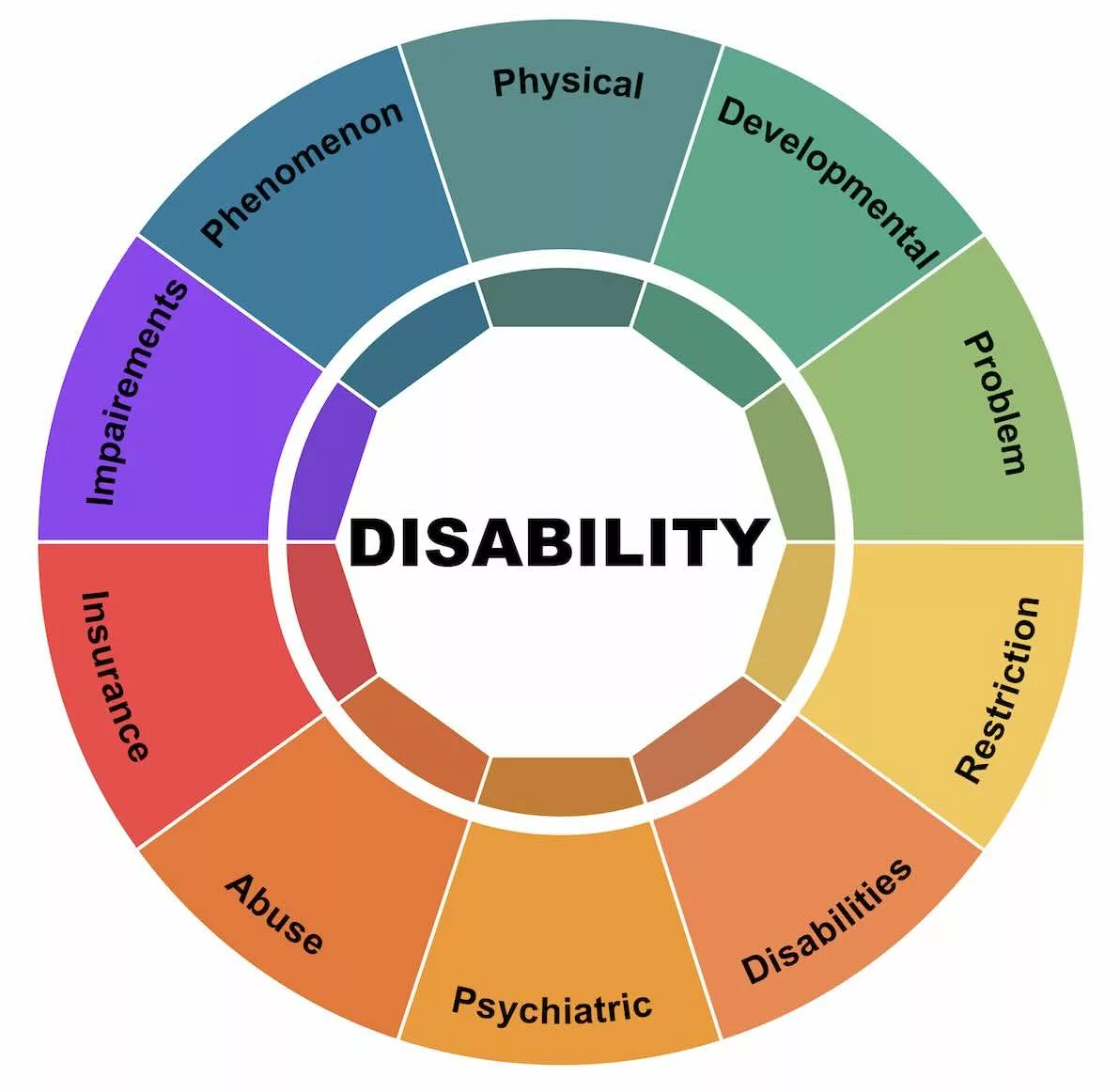Complete Guide to Social Work With Persons With Disabilities
(Summary Section) 2024 Guide for Disabilities Social Worker
Disability social work is a specialized branch of social work that focuses on promoting the well-being of individuals with disabilities, be it physical, intellectual, or developmental. Disability social workers, also known as social worker for disabled adults or disability case managers, serve as essential advocates for disabled individuals and their families.
They specialize in providing social services, assisting in navigating resources, improving the quality of life, and advocating for the rights of disabled adults. Moreover, they play a crucial role in connecting disabled individuals with government support and addressing issues related to social security return to work rules and the social security back to work program.
Learning disability social work, a subset of disability social work, is a specialized field that addresses the needs, challenges, and support required by individuals with learning disabilities. Learning disability social workers specialize in understanding the unique challenges faced by individuals with learning disabilities and provide tailored support, resources, and advocacy to help them lead fulfilling and independent lives.
 Best Disability Social Workers 2024 Guide
Best Disability Social Workers 2024 Guide
Developmental social work, focusing on individuals with developmental disabilities, is another crucial field. Developmental disability social workers assess needs, create personalized support plans, advocate for rights, connect clients with resources, provide emotional and behavioral support, guide transition planning, collaborate with other professionals, and monitor progress when working with developmental disabilities
The Social Security Disability Work Programs, including the Social Security Return to Work Program, aim to assist individuals with disabilities in returning to the workforce while maintaining their disability benefits. These programs provide support, financial incentives, and resources to help disabled individuals transition into the workforce.
In the United States, disability social workers typically earn an annual salary ranging from $39,126 to $59,948, with an average of around $49,413. Nevertheless, it’s crucial for prospective disability social workers to conduct thorough research on salary details tailored to their geographic area and chosen specialization to gain a more precise insight into potential earnings.
Are you looking to get more details about working as a social worker for disabled adults? Keep on reading and get all the information you need!

See Also: Best Micro, Mezzo, Macro Social Work – Job Aid for Social Workers
DETAILED SECTION |
If you’re ready to further explore social work and disability, proceed to our detailed sections below that provide a detailed overview. |
Table of Contents: Best 2024 Disabilities Social Worker Guide
Keep on scrolling down this page to read each section or click any link below to go directly to that section.
- Understanding Disability Social Work | Disability Social Work Job Description
- What Does a Disability Social Worker Do?
- What is Learning Disability Social Work?
- What is Developmental Social Work?
- Role of Disability Social Workers
- Social Services for Disabled Adults
- Disability Social Worker Jobs
- All You Need to Know About Social Security Disability Return to Work Program
- Social Security Return to Work Rules
- Other Social Security Disability Work Programs
- Disabilities Social Worker Salary
- Conclusion | Best Social Work and Disability Guide
- FAQ | 2024 Guide for Disabilities Social Worker
Don’t Miss: Best Developmental Social Work Job Aid
Understanding Disability Social Work | Disability Social Work Job Description
Disability social work, a branch of social work and disability, focuses on promoting the well-being of individuals with disabilities, whether physical, intellectual, or developmental.

Social Work and Disability
What Does a Disability Social Worker Do?
A disability social worker, also known as social security social worker or case workers for the disabled, plays a crucial role in supporting individuals with disabilities and their families. Disability social workers specialize in providing social services for disabled adults, helping them navigate the complex web of resources available, improving their quality of life, and advocating for their rights.
Disabilities social worker also serves as vital links between disabled individuals and the government, often assisting with issues related to social security return to work rules and the social security back to work program. Next, let’s take a look at how disability social work ties in with social work with adults with learning disabilities.

Do you have any further input into what does a disability social worker do? If so, contact the Social Work Portal Team
What is Learning Disability Social Work? | Social Work With Adults With Learning Disabilities
Learning disability social work is a specialized branch of social work that focuses on individuals with learning disabilities. It is a subset of disability social work, but it is not the same as disability social work as a whole.
While both learning disability social work and disability social work involve working with individuals with disabilities, learning disability social work specifically addresses the needs, challenges, and support required by individuals with learning disabilities.

Social Work With Persons With Disabilities
What Does Learning Disability Social Work Encompass?
Learning disability social worker specializes in understanding the unique challenges faced by individuals with learning disabilities and provide tailored support, resources, and advocacy to help them lead fulfilling and independent lives.
Learning disabilities can encompass a wide range of conditions that affect an individual’s ability to acquire, process, or use information effectively. These disabilities can impact various aspects of a person’s life, including:
- education,
- employment,
- social interactions, and
- daily living skills.
What is Social Work With Adults With Learning Disabilities?
Social work with adults with learning disabilities is a specialized field within social work that focuses on providing support and assistance to adults who have learning disabilities. Learning disabilities can encompass a wide range of conditions that affect an individual’s ability to acquire, process, or use information effectively.
Learning disability social worker in this field plays a vital role in helping these adults lead more independent and fulfilling lives – let’s find out what a learning disabilities social worker does in more detail.

Read More: Best Social Work Case Manager Interview Questions & Answers
What Does a Learning Disability Social Worker Do?
A learning disability social worker specializes in supporting individuals with learning disabilities. Their work encompasses a range of essential tasks aimed at empowering these individuals to overcome challenges and achieve their full potential.
The learning disability social worker job description includes:
- assessing needs,
- creating personalized support plans,
- advocating for rights,
- connecting clients with resources,
- providing emotional and behavioral support,
- guiding transition planning,
- collaborating with other professionals, and
- monitoring progress.
Learning disability social workers serve as invaluable allies for individuals with learning disabilities, offering a multifaceted approach to enhance their well-being and facilitate their journey toward personal growth and success.
Next, we’re taking a look at working with people with developmental disabilities social work connects with social work with people with disabilities in general.
Do you have feedback on SSI social worker or case workers for the disabled provided in this guide? Click here to contact the Social Work Portal Team.
What is Developmental Social Work? | Role of Developmental Disabilities Social Worker
Developmental social work, specializing in individuals with developmental disabilities, requires the expertise of a developmental disabilities social worker. For those considering careers working with developmental disabilities, it’s crucial to understand the unique challenges of working with people with developmental disabilities.
What Does Developmental Disabilities Social Worker Do?
Developmental disability social worker assesses the needs of individuals with developmental disabilities, develop personalized support plans, and advocate for the rights of those with developmental disabilities. They also connect clients with relevant resources and provide essential emotional and behavioral support.
Developmental disabilities social worker guides:
- transition planning,
- collaborate with other experts, and
- consistently monitor progress when working with persons with developmental disabilities.
What Does Working With Developmental Disabilities Entail?
In this field, working with developmental disabilities demands a deep understanding of the unique challenges and opportunities faced by individuals with developmental disabilities. Developmental disability social worker plays a crucial role in fostering the development and independence of persons with developmental disabilities, helping them lead fulfilling lives, and promoting their integration into their communities.
Related: Best Guide on Case Management in Social Work | What You Need
Role of Disability Social Workers | All You Need to Know About Role of Social Worker in Disability
The role of a disability social worker is multifaceted and varies depending on the specific needs of their clients. As we already mentioned, they may work with individuals with learning disabilities, in which case they become learning disability social workers, or individuals with developmental disabilities, thus becoming developmental disability social workers.
The primary responsibilities and role of social worker in disability include:
- Assessment and Advocacy: Disability social workers evaluate the needs of their clients, advocating for the services and support required for their overall well-being.
- Accessing Services: Social worker for disabled adults helps individuals access essential social services, including medical care, housing, education, and employment opportunities.
- Case Management: Social workers for disabled adults offer comprehensive case management services, coordinating and overseeing care plans for their clients.
- Educational Support: In the case of learning disabilities, they may collaborate with schools to create personalized educational plans that meet their clients’ unique needs.
- Empowerment: Disability social workers empower their clients to become self-sufficient and actively participate in their communities.
- Understanding Benefits: Social worker for disabled adults also guides clients through the intricacies of social security disability work programs and social security return to work rules, ensuring they receive the benefits they are entitled to.
In the section below, we’ll take a look at social services for disabled adults.

Don’t Miss: Best Social Work Services Provided by Social Work Agencies, Workers, and Practices
Social Services for Disabled Adults | Social Work With Persons With Disabilities
Social services for disabled adults play a vital role in ensuring the well-being and support of this often marginalized population. A dedicated social worker for disabled adults is instrumental in coordinating and providing the necessary assistance and resources.
Social services for disabled adults encompass a wide range of programs and support designed to enhance their quality of life and promote independence.
Social services for disabled adults may include:
- Assistance with Daily Living: This includes help with activities of daily living (ADLs), such as bathing, dressing, meal preparation, and mobility.
- Housing and Accommodation Services: Programs that offer accessible and supportive housing options for disabled adults.
- Employment Support: Vocational training, social security disability work programs, and job placement services to help disabled adults find and maintain employment.
- Transportation Services: Accessible transportation options for disabled individuals to ensure they can participate in various community activities.
- Counseling and Mental Health Services: Access to mental health professionals who can provide counseling and therapy for individuals with disabilities.
- Healthcare Coordination: Assistance in coordinating medical care and managing health conditions.
 Social Work with Disabled People
Social Work with Disabled People
- Recreation and Socialization Programs: Opportunities for disabled adults to engage in recreational activities and socialize with their peers.
- Advocacy Services: Advocates who work to protect the rights and interests of disabled adults in various aspects of life.
- Education and Training: Programs that offer educational opportunities and skill-building courses to empower disabled adults.
- Assistive Technology: Access to assistive devices and technology that can improve the daily functioning of disabled individuals.
- Respite Care: Temporary relief for caregivers of disabled adults, allowing them to take a break while ensuring their loved ones receive appropriate care.
- Legal Services: Assistance with legal matters, including disability benefits, guardianship, and estate planning.
- Financial Assistance: Support with financial management and access to disability-related benefits and resources.
Overall, the presence of social services for disabled adults and the commitment of social workers for disabled adults play an indispensable role in enhancing the quality of life and fostering the independence and inclusion of this deserving population. With a good understanding of services, let’s move on to disability social worker jobs.
Popular Article: Best Guide for Mezzo Social Workers
Disability Social Worker Jobs | Social Work With Disabled People
Disability social worker jobs play a vital role in promoting social inclusion, providing support, and enhancing the quality of life for individuals with disabilities. These professionals work tirelessly to advocate for the rights and needs of disabled individuals, making a significant impact in various aspects of their lives.
In this section, we will delve into the world of social work and disability, highlighting the importance of careers working with developmental disabilities and social services for disabled persons, while also touching on the role of the social security case worker in this context.
Social Worker for Disabled Adults
Social workers for disabled adults specialize in working with individuals with disabilities who have reached adulthood. They provide a range of services to help these adults live independently and access the support they need.
This disabilities social worker role involves:
- assessing individual needs,
- advocating for services, and
- connecting clients with resources that promote self-sufficiency.
Developmental Disabilities Social Worker
Careers working with developmental disabilities often involve becoming a developmental disabilities social worker. These professionals focus on supporting individuals with developmental challenges throughout their lives.
Developmental disabilities social worker assists in areas such as:
- education,
- employment, and
- daily living skills.
Social Security Case Worker
Social security case workers are essential in helping disabled individuals navigate the complex system of disability benefits and entitlements. Social security case worker works in collaboration with disability social workers to ensure that clients receive the financial and healthcare support they need to lead comfortable lives.
Social Services Coordinator for Disabled Persons
Social services coordinators for disabled persons play a critical role in connecting disabled individuals with various support services. These professionals assess the specific needs of individuals with disabilities and facilitate access to these services to promote their well-being and independence.
These social services for disabled adults may include:
- housing assistance,
- vocational training,
- healthcare coordination, and
- counseling.
 Disability Social Worker Jobs
Disability Social Worker Jobs
Rehabilitation Counselor
Rehabilitation counselors work closely with individuals who have disabilities, helping them develop skills and strategies to lead productive and independent lives. They focus on vocational and personal counseling to enhance the employability and quality of life for disabled people, including those with physical, cognitive, or emotional disabilities.
School Social Worker for Special Education
School social workers specializing in special education work with students who have disabilities, ensuring that they receive the support and accommodations they need to succeed in an educational setting. They collaborate with teachers, parents, and other professionals to create individualized education plans (IEPs) and provide emotional and behavioral support.
Mental Health Social Worker for Disabled People
Social workers in this role work with individuals who have disabilities related to mental health conditions. They provide counseling, therapy, and support services to help clients manage their conditions and improve their overall well-being. Disability social workers may also collaborate with mental health professionals and healthcare providers to create comprehensive treatment plans.
Assistive Technology Specialist
Assistive technology specialists are responsible for assessing and recommending technologies that can help individuals with disabilities lead more independent lives. They work with various devices, software, and tools that can enhance communication, mobility, and daily living tasks, ensuring that these technologies are tailored to the specific needs of each client.
Disability social worker jobs encompass a diverse range of roles and responsibilities, all aimed at improving the well-being and quality of life for individuals with disabilities. Social work and disability is a field that plays a crucial role in fostering inclusion and empowerment for people with disabilities.
With that said, we’ll get into all the intricacies of the social security disability return to work program.

Do you have any further insight into what does a social worker do for the disabled? If so, contact the Social Work Portal Team.
All You Need to Know About Social Security Disability Return to Work Program
The Social Security Back to Work Program, often referred to as the “Ticket to Work” program in the United States, is a vital initiative aimed at helping individuals with disabilities return to the workforce and achieve financial independence.
Social security return to work program was introduced to address the unique challenges faced by individuals who may be receiving Social Security Disability Insurance (SSDI) or Supplemental Security Income (SSI) benefits.
Key features of the Social Security Back to Work Program include:
- Support for Individuals with Disabilities: The program is designed to assist individuals with disabilities who wish to reenter the workforce and reduce their reliance on government benefits. This can provide them with a sense of dignity and self-sufficiency.
- Voluntary Participation: Participation in the program is entirely voluntary, giving individuals the choice to seek employment without fear of losing their disability benefits. It allows beneficiaries to “test the waters” of work without jeopardizing their financial safety net.
- Work Incentives: One of the main components of the program is the provision of various work incentives to encourage beneficiaries to work. These incentives may include extended periods of medical coverage, continuation of cash benefits during a trial work period, and protection against a medical Continuing Disability Review (CDR) while participating in the program.
- Vocational Rehabilitation Services: Participants in the Back to Work Program can access vocational rehabilitation services to help them develop the skills necessary to find and maintain employment. This might include job training, education, and other supportive services.
 Social Work with People with Disabilities – SSI social worker
Social Work with People with Disabilities – SSI social worker
- Employment Network and State Vocational Rehabilitation Agencies: The program collaborates with a network of employment service providers known as Employment Networks (EN) and State Vocational Rehabilitation (VR) agencies. These entities help participants navigate the employment process and offer valuable assistance in finding suitable job opportunities.
- Milestones and Progress: Beneficiaries can set and achieve specific work-related milestones through the program. These milestones can vary from person to person and may be adjusted according to individual needs and capabilities.
- Continuing Benefits: Even if a person successfully returns to work and is no longer considered disabled according to the Social Security Administration‘s criteria, the program provides a safety net. It allows for a period during which beneficiaries can continue receiving benefits if they experience difficulties in maintaining their employment due to their disability.
The Social Security Back to Work Program plays a crucial role in fostering economic independence and improving the overall quality of life for individuals with disabilities. It promotes the idea that work is a viable and meaningful option for many people with disabilities, helping them regain a sense of purpose, self-worth, and financial stability.
Now that we know what social security back to work program is about, we need to go over the social security return to work rules. Let’s do it!
Do you know of any social work and disability PDF resources that our readers should know about? We’d love to hear from you.
Social Security Return to Work Rules
Social Security Return to Work Rules, also known as the Social Security Administration’s (SSA) work incentives programs, are designed to encourage individuals with disabilities to re-enter the workforce while maintaining their eligibility for Social Security Disability Insurance (SSDI) or Supplemental Security Income (SSI) benefits.
These rules recognize the importance of work and self-sufficiency for individuals with disabilities, acknowledging that many of them want to and can contribute to the workforce despite their impairments. Here are some key components and features of social security return to work rules:
Trial Work Period (TWP)
The TWP allows individuals receiving SSDI benefits to test their ability to work for a limited period without affecting their benefit eligibility. During the TWP, beneficiaries can work for up to nine months over a rolling 60-month period and continue to receive their full SSDI benefits regardless of their earnings. The TWP provides a safety net for those who wish to return to work without the fear of losing their benefits right away.
Extended Period of Eligibility (EPE)
After completing the TWP, beneficiaries enter the EPE. This period lasts for 36 consecutive months, during which individuals continue to receive benefits for any month their earnings fall below the Substantial Gainful Activity (SGA) threshold. The SGA threshold is the amount of monthly earnings that the SSA considers to be substantial, and it is adjusted annually.
Grace Period
After the EPE, beneficiaries have an additional three months, known as the Grace Period, to continue receiving benefits without meeting the SGA threshold if their earnings exceed it. This provides a transitional phase to help individuals maintain financial stability while adjusting to full-time work.
Expedited Reinstatement
If a beneficiary’s disability prevents them from continuing to work within five years after their benefits were terminated due to SGA-level earnings, they can request Expedited Reinstatement. This process allows them to have their benefits reinstated without having to go through the entire application process again.

Social Security Return to Work Program Rules
Impairment-Related Work Expenses (IRWE)
Beneficiaries can deduct certain work-related expenses directly related to their disability when calculating their monthly earnings for SSA purposes. This deduction helps offset the impact of these expenses on their ability to earn income and maintain benefits.
Plan to Achieve Self-Support (PASS): A PASS is a written plan that outlines specific work-related goals, the services and resources needed to achieve those goals, and how the person intends to pay for them. Beneficiaries can set aside income and resources to help achieve their vocational objectives while continuing to receive benefits.
Ticket to Work Program
This program provides free vocational rehabilitation services, employment support, and other resources to beneficiaries. The goal is to help them improve their employability and successfully transition back into the workforce.
These social security return to work rules aim to create a safety net that encourages individuals with disabilities to pursue employment opportunities without jeopardizing their financial security. By providing flexibility and support, these rules recognize that many disabled individuals have the potential to lead more independent lives and contribute to society through gainful employment.
Do you have any input on forensic social workers salary that we haven’t mentioned? If so, contact the Social Work Portal Team.
Other Social Security Disability Work Programs
Apart from the Social Security Disability (SSDI) Return to Work Program, there are various other work incentive programs and initiatives designed to assist individuals with disabilities in finding employment and maintaining financial independence.
These programs are intended to provide support, financial incentives, and resources to help disabled individuals transition into the workforce or return to work while still receiving disability benefits. Here are some of the notable ones:
Vocational Rehabilitation (VR) Services
VR programs are state-funded and federal-state cooperative initiatives that offer counseling, job training, and other support services to individuals with disabilities. These programs aim to help participants acquire the skills and resources necessary to obtain and maintain employment.
Medicaid Buy-In Programs
Some states offer Medicaid Buy-In programs that allow individuals with disabilities to earn income and maintain Medicaid coverage. These programs help disabled individuals access necessary healthcare services while working, even if their income exceeds traditional Medicaid eligibility limits.
Achieving a Better Life Experience (ABLE) Accounts
ABLE accounts are tax-advantaged savings accounts designed for individuals with disabilities. These accounts allow beneficiaries to save and invest money for qualified disability-related expenses without affecting their eligibility for public assistance programs, including SSDI and SSI.
Work Opportunity Tax Credit (WOTC)
The WOTC is a federal tax credit available to employers who hire individuals from targeted groups, including disabled workers. This credit provides a financial incentive to employers to hire and retain workers with disabilities.
Customized Employment
Customized employment is an approach that tailors job positions to match the strengths and abilities of individuals with disabilities. It focuses on finding unique employment solutions that suit the specific needs and skills of each disabled worker.
Supported Employment
Supported employment programs offer job coaching, job placement assistance, and ongoing support to individuals with significant disabilities, helping them secure and maintain meaningful employment.
Independent Living Centers
Independent Living Centers (ILCs) offer a range of services and resources to support disabled individuals in achieving greater independence, including employment-related assistance.
These programs and initiatives vary by state and region, and eligibility criteria may differ. It’s essential for individuals with disabilities to research the available options and consult with disability service providers to determine which programs best suit their needs and goals. These initiatives collectively aim to empower disabled individuals to participate in the workforce, improve their financial stability, and enhance their quality of life.
Lastly, let’s take a look at what you can expect in terms of disability social worker salary – if this is the career route you decide to take.

Do you have additional feedback on social security social worker/social worker for disabled adults jobs? Click here to contact the Social Work Portal Team.
Disability Social Worker Salary | Disabilities Social Worker Income
Disabilities social workers play a critical role in assisting individuals with disabilities to access support services, advocacy, and resources to improve their quality of life. Disability social worker salary can vary significantly based on several factors, including their:
- level of experience,
- education,
- location,
- employer, and
- the specific field of social work they are engaged in.
In the United States, the salary range for a disability social worker job typically falls between $39,126 and $59,948 per year, with the average annual salary being approximately $49,413. However, it is essential for aspiring disabilities social worker to research salary information specific to their location and field of interest to get a more accurate understanding of earning potential.

Social Work with Disabled People Salary
Here are some factors that will impact the disability social worker salary range:
Experience: Salary often increases with experience. Entry-level disability social workers typically earn less than those with several years of experience in the field.
Education: Having a bachelor’s degree in social work (BSW) is the minimum requirement to become a social worker, but many professionals in this field pursue a master’s degree in social work (MSW), which can lead to higher-paying positions.
Location: Geographic location plays a significant role in determining a disability social worker’s salary. Metropolitan areas and regions with a higher cost of living tend to offer higher salaries to compensate for the increased expenses.
Employer: Disability social workers may work in a variety of settings, including government agencies, non-profit organizations, healthcare institutions, schools, and private practice. Salaries can vary depending on the type of employer.
Field of Practice: Disability Social Workers can work in different areas, such as healthcare, mental health, rehabilitation, education, and more. Specialized roles may offer different salary ranges.
Do you have any social work and disability PDF our readers should know about? Contact the Social Work Portal Team.
Conclusion | Best Social Work and Disability Guide
The world of disability social work is a multifaceted and crucial field dedicated to enhancing the well-being and quality of life for individuals with disabilities. Disabilities social worker, learning disability social workers, and developmental disability social workers are the unsung heroes who assess needs, create personalized support plans, advocate for rights, and connect clients with resources to promote independence.
As we acknowledge the importance of disability social work and the role it plays in promoting social inclusion, it is vital to remember that this field is about more than just numbers; it’s about the positive impact these dedicated professionals have on the lives of individuals with disabilities. So, if you’re considering a career in disability social work or if you’re already a part of this field, know that your work is making a meaningful difference and contributing to a more inclusive and compassionate society.
We wish you a smooth and rewarding journey!
Don’t Miss: Best Clinical, Medical & Hospital Social Worker Guide – All You Need to Know
FAQ | 2024 Guide for Disabilities Social Worker
What is disability social work?
Disability social work, a branch of social work and disability, focuses on promoting the well-being of individuals with disabilities, whether physical, intellectual, or developmental.
What does a disability social worker do?
A disability social worker, also known as a disability support worker or disability case manager, plays a crucial role in supporting individuals with disabilities and their families.
What is the social security return to work program?
The Social Security Back to Work Program, often referred to as the Ticket to Work program in the United States, is a vital initiative aimed at helping individuals with disabilities return to the workforce and achieve financial independence.
What’s the average disability social workers salary in the United States?
In the United States, the salary range for a Disability Social Worker job typically falls between $39,126 and $59,948 per year, with the average annual salary being approximately $49,413.
Note: Content on Social Works socialworkportal.com website is copyrighted.
Social Work Portal Disclaimer:Social Work Portal is not a social work agency and we do not refer social workers. This web site is provided for educational and informational purposes only and does not constitute providing medical advice or professional services. The information provided should not be used for diagnosing or treating a health problem or disease, and those seeking personal medical advice should consult with ... Read our full disclaimer here: Social Work Portal Disclaimer.
Image sources: Stock.adobe.com


